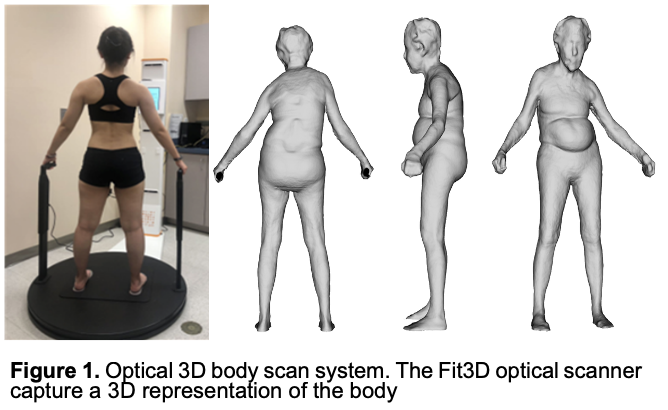Imagine if your physician could use their smartphone to measure your body composition and determine if you were at risk for loss of physical function. Jason Dring, PT, DPT, an assistant professor in the George Washington University (GW) School of Medicine and Health Science (SMHS) Doctorate of Physical Therapy (DPT) program, is collaborating on a pilot research project funded by a federal grant to do just that.
The research is focused on new methods to diagnose sarcopenia, the age-related loss of muscle mass and physical function. Currently, the gold standard to detect sarcopenia is a DEXA scan, which is a medical imaging test that measures bone density and body composition. However, Dr. Dring and colleagues are exploring the use of a simple 3D body scan as an alternative to using a DEXA scan to detect sarcopenia.
If body shape from 3D body imaging is found to accurately detect sarcopenia in older adults, this technology could serve as a potentially transformative screening tool. The ability to utilize 3D body imaging on a smartphone would increase access to testing for more patients, allowing for earlier detection of sarcopenia. With earlier detection of sarcopenia through a body scan, older adults can not only gain information on their physical function, but also implement tools to improve their function, which could include physical therapy.
Dr. Dring is one of five investigators in this study, composed of experts from GW and the University of North Carolina-Chapel Hill. At GW, this work is interdisciplinary and has allowed Dr. Dring to work alongside other faculty members from the GW School of Medicine, the GW Milken School of Public Health, and the GW College of Engineering. “Working on this project has shown me how much I enjoy collaborating across disciplines —connecting with experts outside my own field makes the research much more creative, relevant, and ultimately more meaningful for our patients,” Dring reports.
Dr. Dring’s clinical expertise lies in the use of physical therapy for management and care of older adults. Specifically, Dring specializes in age-related losses in muscle strength, community fall risk reduction, and optimal aging. His experience was crucial in the composition of the research grant proposal, as he focused on the clinical relevance of the research and the safety of the participants in the protocol.
The project received pilot funding through a grant from the National Institute of Aging. Additional funding to support the research was provided through the GW Cross-Disciplinary Research Fund which supports collaborative research partnerships between different disciplines at the university.
This research is only one piece of what Dring describes to be an ultimate goal in his career. Through “finding the most efficient ways to screen older adults for loss of mobility”, Dring and colleagues look forward to seeing how their results will impact the clinical care of older adults.

